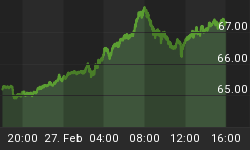The first rule of holes is that when you find yourself in one, quit digging. Not so for Americans, who simply buy larger imported shovels. Take today's personal spending and income data, which revealed a .3% rise in February personal incomes, the largest increase in four months. Yet did Americans use any of those income gains to pay down even a small portion of the staggering debts they have been accumulating, even as their IOU's continue to lose value on foreign exchange markets with each passing day? Not likely. In fact, they even managed to go further into debt by increasing their spending by .5%. As a result, the personal savings rate slipped again, to a meager .6%.
The conventional "wisdom" praises Americans for their profligacy while condemning foreigners for their thrift (ironic because without foreign savings, Americans could not borrow). As a result, Wall Street and the media predictably received this data as good news. What would have been the reaction had American consumers acted responsibly for a change and had denied themselves some current gratification for the sake of the future? What if they acted like adults, rather than undisciplined children, and paid down debt? What if they had decided to put some money aside for their kids, a financial emergency, or retirement? What if personal spending actually declined?
Such an inevitable first step down the road to financial responsibility would have been greeted by Wall Street and the media as a disaster; evidence that the "heroic" consumer had finally run out of gas. This is because the entire house of cards that is the U.S. economy, and the over valued stock and housing markets it supports, rests on the continuation of reckless borrowing and consumption which must inevitably come to an end. Given the fact that sooner or later the American consumer will "run out of gas," wouldn't it make sense for him to refill his tanks before they run dry? Ironically, the longer consumers borrow and spend, the more severe the long-term damage they inflict on the U.S. economy, and the greater the inevitable declines in the very asset prices their irresponsible behavior temporarily props up.















